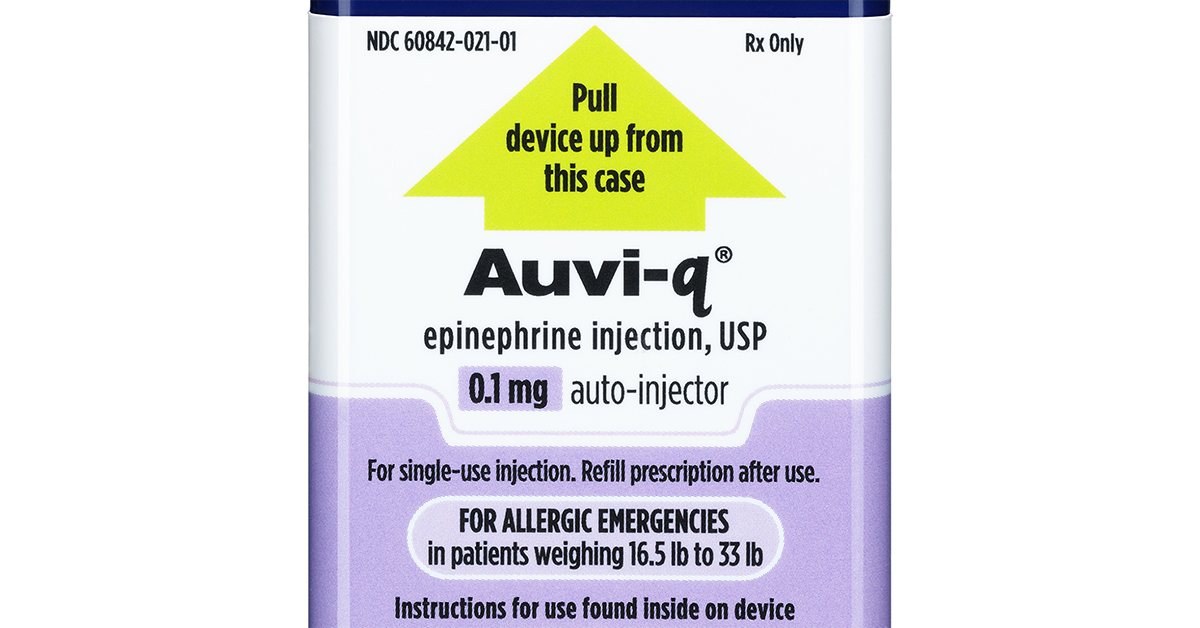With Life-Threatening Allergies Diagnosed in Infancy, kaléo Announces Availability of First and Only FDA-Approved Epinephrine Auto-Injector (EAI) for Infants and Toddlers Weighing 16.5 to 33 Pounds (7.5 to 15 kilograms)
With Life-Threatening Allergies Diagnosed in Infancy, kaléo Announces Availability of First and Only FDA-Approved Epinephrine Auto-Injector (EAI) for Infants and Toddlers Weighing 16.5 to 33 Pounds (7.5 to 15 kilograms)
— AUVI-q® (epinephrine injection, USP) 0.1 mg auto-injector is specifically designed for infants and toddlers weighing 16.5 to 33 pounds (7.5 to 15 kilograms)
— Available in the United States by prescription for $0 out-of-pocket for commercially insured patients through the AUVI-Q AffordAbility Program and Direct Delivery Service starting May 1st
Richmond, VA (April 26, 2018) — kaléo, a privately-held pharmaceutical company, today announced that AUVI-q ® (epinephrine injection, USP) 0.1 mg will be available nationwide by prescription beginning May 1, 2018. AUVI-q 0.1 mg is indicated for the treatment of lifethreatening allergic reactions, including anaphylaxis, in infants and toddlers weighing 16.5 to 33 pounds (7.5 to 15 kilograms). Featuring a shorter needle length and lower dose of epinephrine than other FDA-approved epinephrine auto-injectors (EAIs), AUVI-q 0.1 mg is the first and only FDA-approved EAI designed for this patient population. Like the rest of the AUVI-Q family, AUVI-q 0.1 mg features a voice instruction system that helps guide caregivers step-by-step through the injection process, as well as a needle that automatically retracts following administration.
“This day means a lot to me personally, as I suffer from life-threatening allergies and have a child who was diagnosed with life-threatening allergies as an infant,” said Eric S. Edwards, MD, PhD, Vice President of Innovation and Research & Development at kaléo. “Before the introduction of AUVI-q 0.1 mg, the youngest and most vulnerable population (16.5 to 33 pounds; 7.5 to 15 kilograms) did not have a treatment for anaphylaxis designed for them.”
Children are increasingly being treated for anaphylaxis. There was an estimated 130 percent increase in emergency room visits for anaphylaxis among children four years old and younger between 2005 and 2014. 1 For an infant or small child with a life-threatening allergy (LTA), even a small amount of an allergen such as a single peanut could cause a severe allergic reaction, which could potentially be fatal. It is estimated that nearly 39 percent of children with food allergies have a history of severe food-induced reactions.
“Anaphylactic reactions can be frightening and serious, and when experienced by the very young, some of whom can’t communicate about what’s happening, these episodes can be particularly alarming,” according to Dr. Vivian Hernandez-Trujillo, pediatric allergist and fellow of the American Academy of Allergy, Asthma and Immunology, American College of Allergy, Asthma and Immunology, and American Academy of Pediatrics. “Now, caregivers can have AUVI-q 0.1 mg in hand to respond to an allergic emergency and safely administer epinephrine to infants and toddlers.”
Recent studies have revealed that delaying the introduction of some foods to children may actually increase their risk of developing food allergies. 3,4 The National Institutes of Health (NIH) updated its allergy prevention guidelines, recommending parents introduce peanut-containing foods to certain infants as early as 4 to 6 months of age.
“A diagnosis of a life-threatening allergy – especially in an infant or toddler – can have a major impact on the entire family. It is extremely important for parents and caregivers to be prepared in case of a severe allergic reaction,” said Kenneth Mendez, the President and CEO of the Asthma and Allergy Foundation of America (AAFA). “The availability of AUVI-q 0.1 mg as the first and only FDA-approved EAI designed for this patient population is positive news for our community.”
“I would have loved to have had the AUVI-q 0.1 mg available back when my son was an infant and was first diagnosed with an egg and wheat allergy,” said Dr. Todd Mahr, a pediatric allergist from La Crosse, Wisconsin, President-Elect of the American College of Allergy, Asthma and Immunology and immediate past-chair of the American Academy of Pediatrics’ Section on Allergy and Immunology. “Prior to this, there was no EAI specifically designed for infants and toddlers weighing 16.5 to 33 pounds (7.5 to 15 kilograms), so the AUVI-q 0.1 mg helps to address that significant unmet need.”
Each AUVI-q 0.1 mg prescription includes two auto-injectors and one Trainer for patients and caregivers to practice administration before an allergic emergency happens. The AUVI-q 0.1 mg will also include a 2 second countdown, like the 0.15 mg and 0.3 mg doses.
AUVI-Q is the number-one prescribed brand of epinephrine auto-injectors among allergists.6 “We are proud to now offer epinephrine solutions for a new member of the family,” said Phil Rackliffe, General Manager, Allergy and Pediatrics at kaléo. “We are committed to our collaborative approach to patient-inspired design in medicine.”
To learn more about AUVI-Q (0.3 mg, 0.15 mg and 0.1 mg), visit www.auvi-q.com, or follow AUVI-Q on Facebook or Twitter. For questions on how to get AUVI-Q, please call the AUVI-Q hotline at 1-877-30-AUVIQ. The sNDA for the AUVI-q 0.1 mg was granted Priority Review by the FDA, an expedited regulatory pathway reserved for products that may provide significant improvements in the safety or effectiveness of the treatment, diagnosis, or prevention of serious conditions when compared to available therapies.
See the entire press release here.





